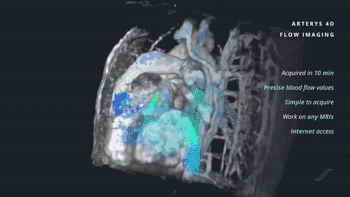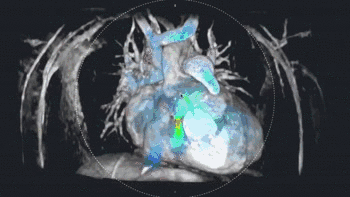Release date: 2017-01-18
Cardiovascular magnetic resonance imaging (CMR), commonly known as cardiac MRI, plays a crucial role in the diagnosis of heart disease. This technology has also experienced development from 2D to 3D. At present, two companies have joined forces to subvert the existing cardiac MRI, introduce 3D MRI into a new time dimension, and expand its MRI to 4D, which not only can display the heart structure in all directions, but also display the speed of blood flow. , direction and flow. The two companies, one is GE Healthcare, a giant of General Electric, and the other is San Francisco startup Arterys.
As one of the market leaders, GE Healthcare found some limitations with existing MRI scanners. For example, a patient has symptoms of heart disease (non-urgent symptoms) that the doctor suspects are caused by a patient's heart valve wear or deformity. Under normal conditions, heartbeat will push blood from one chamber to the next, and the valve should be closed in time to prevent blood from flowing back. The valve is then reopened to allow future blood to pass.
Using existing imaging techniques such as echocardiography and cardiac MRI can help doctors understand the patient's heart condition and valve condition. In the process, the doctor tried his best to instruct the MRI technician to take a 2D heart image and wanted to judge what went wrong. This process can be very long, ranging from 45 minutes to 60 minutes, and the patient will not only become very nervous, but may also be asked to remain calm and repeatedly hold their breath. Although the last image was still available, the prior art has a big drawback: it is difficult to tell the doctor how the heart valve leaks blood. This means that doctors must make a difficult decision: either to have a patient undergoing invasive cardiac surgery, which is costly and risky; or to take medication to manage the condition, but if the situation is serious, the best treatment time will be missed.
To this end, in response to the limitations of existing MRI scanners, GE Healthcare and Stanford University have cooperated and developed the innovative imaging technology ViosWorks after five years of development, which can present the heart from seven dimensions: including three spatial dimensions. , 1 time dimension, 3 speed dimensions.
"ViosWork is very simple to operate," said Ioannis Panagiotelis, global marketing director at GE Healthcare's MRI department. "It can shorten the traditional MRI time from 45 minutes to 60 minutes to less than 10 minutes, and patients can breathe freely during the exam. You don't need to breathe as carefully as before. In short, it will make people's MRI more rapid and universal." In addition, traditional magnetic resonance imaging is presented on a thin sheet, while ViosWorks can be video- based. Presents real-time conditions throughout the chest, including blood flow, ventricular contractions, and acute bleeding points and scars.
The increase in image presentation dimensions is accompanied by a large increase in data volume, which means that cardiac MRI requires innovative image analysis methods, which is why GE Healthcare has chosen to work with San Francisco startup Arterys after the revolutionary ViosWork. In March 2016, Arterys received GE's more than $12 million Series A financing and received a GE Healthcare license to access the ViosWorks cardiac MRI system.
The richer data dimension that ViosWorks' cardiac MRI system brings means that the traditional way of presenting images is outdated. To this end, Arterys has developed a new image rendering method, 4D Flow.


â–² can be observed from any angle
4D Flow not only presents the entire cardiovascular and heart structure, but also the heart from any angle. It also shows the direction and flow of blood flow over time as it adds a fourth dimension of time.
In order to turn huge raw data into images that doctors can visually observe, Arterys applies the technology originally used for 3D animation to MRI images. But the sheer volume of data is very demanding on computing power, so Arterys started using Amazon's cloud computing services.
"In 2012, when we first started working together, Amazon just launched GPUs service in public cloud computing (essential for 3D image production)," said Axerio-Cilies, co-founder of Arterys, which is GE Healthcare. The next generation of cardiac magnetic resonance imaging opens a door. Arterys used Amazon's cloud computing service to analyze data from MRI scanners. "In a few short years, the connection between us made our original vision come true."
"This is the first breakthrough application of cloud computing technology in clinical applications," said Fabien Beckers, CEO and co-founder of Arterys. Eric Stahre, CEO of GE Healthcare, believes the move marks GE Healthcare as the first vendor to move MRI data to the cloud.
John Flannery, CEO of GE Healthcare, predicts that data on medical devices will increase by 50 times by 2020. To address this data growth, GE Healthcare announced the end of last year the establishment of GE Healthcare Cloud, a web-based data processing and processing collaboration platform that can connect to more than one million imaging devices. The company is inviting 3D medical imaging developers to work within the platform.
Therefore, the data processing of the Viosworks scan will eventually be transferred from Amazon's servers to the GE Health Cloud. This "4D Flow" system can capture 5GB of data, while traditional MRI scanners can only get 100M of data.
Meanwhile, Arterys also developed a software to protect patient privacy, before uploading to the cloud server, they will be stripped of personally identifiable information from the original document in the scanner.
Currently, Viosworks has not officially entered the market, only for Stanford and nine other medical research centers. Arterys will also be commercialized in 2017. In January 2017, Arterys' cloud-based, deep learning image analysis system received FDA approval, the first FDA- approved 4D image analysis system based on cloud computing and deep learning. With the introduction of deep learning, Arterys said it can automatically generate clinical reports within 10 minutes, and can add 4D Flow video screenshots to the report and sync them to the PACS.
German industrial giant Siemens is GE Healthcare's main competitor in MRI scanners. There is currently no 4D MRI system available, but a Siemens spokesperson said it is in development. The next challenge for Viosworks and Arterys is how to convince hospitals and doctors to use them. GE Healthcare did not give clear information about the price of Viosworks, but GE Healthcare CEO Eric Stahre said: "We are working hard to make it available to patients around the world."
GE Healthcare believes that insurance companies pay a fixed fee for traditional MRI exams, even if some patients have a much longer inspection time than others. The use of Viosworks will greatly shorten the setup time and scan time of the MRI scanner, so the hospital can check more patients within one day. And the doctor doesn't have to spend a lot of time guiding the MRI technician to take a picture of a qualified image, and it doesn't take time to calculate blood flow, which can be done by Arterys.
At the same time, GE Healthcare and Arterys hope to introduce machine learning based on large-scale, anonymous MRI scans and analysis, further predicting heart disease based on image features of medical images, and assisting doctors to make more accurate judgments.
In addition, cardiac MRI is only the first step, and Viosworks will expand to other areas. "We have only entered a level," Stahre said.
Reference materials:
[1]http:// FDA -clearance-for-the-first-zero-footprint-medical-imaging-analytics-cloud-software-with-deep-learning -for-cardiac-mri-300387880.html? Tc=eml_cleartime#continue-jump
[2]http://
Source: Singularity Network
We're professional Proctology Instruments manufacturers and suppliers in China, specialized in providing high quality medical instruments with reasonable price. We warmly welcome you to buy or wholesale bulk Proctology Instruments for sale here and get quotation from our factory.
Proctology Instruments,Proctoscopy Instruments,Sigmoidoscopy Instruments,Sigmoidoscope Rectoscopy Instruments
Tonglu WANHE Medical Instrument Co., Ltd , https://www.tlvanhurhealth.com